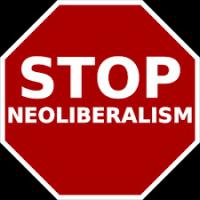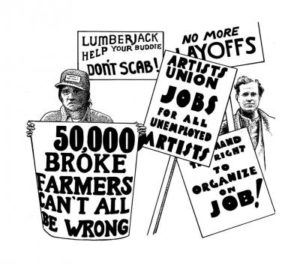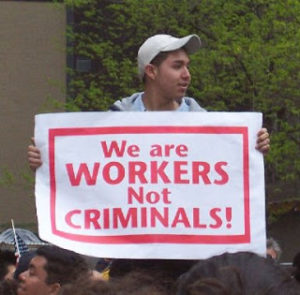 After ten years of economic contraction, many of the citizens of Puerto Rico find themselves watching the secular decomposition of a reality that in its heyday was painted by many as one of relative socio-economic welfare.
After ten years of economic contraction, many of the citizens of Puerto Rico find themselves watching the secular decomposition of a reality that in its heyday was painted by many as one of relative socio-economic welfare.
Wealth Extraction, Governmental Servitude, and Social Disintegration in Colonial Puerto Rico
Washington and Moscow: Halt the Bombing and Stop Supporting Dictators in the Middle East!
 Outside powers have had a long and shameful history of cynically supporting dictatorships in the Middle East because maintaining friendly autocratic states in the region suits their geopolitical objectives. And today those criminal policies are flagrantly on display.
Outside powers have had a long and shameful history of cynically supporting dictatorships in the Middle East because maintaining friendly autocratic states in the region suits their geopolitical objectives. And today those criminal policies are flagrantly on display.
Neoliberalism, Austerity, and Authoritarianism
 Ask anyone what neoliberalism means and they’ll tell you it’s an economic system that corresponds to a particular economic philosophy. But any real-world economic system has a corresponding political system to promote and sustain it.
Ask anyone what neoliberalism means and they’ll tell you it’s an economic system that corresponds to a particular economic philosophy. But any real-world economic system has a corresponding political system to promote and sustain it.
Putin, the War in Ukraine, and the Far Right
 Putin’s Russia is an imperialist state dominated by a capitalist oligarchy that controls the state and that has developed a bellicose attitude toward its neighbors, whom the oligarchy reproaches for having taken advantage of the collapse of the Soviet Union in order to escape its century-long tutelage.
Putin’s Russia is an imperialist state dominated by a capitalist oligarchy that controls the state and that has developed a bellicose attitude toward its neighbors, whom the oligarchy reproaches for having taken advantage of the collapse of the Soviet Union in order to escape its century-long tutelage.
Even Better the Second Time Around
 Originally published in 1979, Beyond the Fragments (BTF) was an intervention in the left by three British socialist-feminist activists who offered a thoroughgoing critique of democratic centralism and the vanguard party ideal as it was then practiced on the revolutionary left.
Originally published in 1979, Beyond the Fragments (BTF) was an intervention in the left by three British socialist-feminist activists who offered a thoroughgoing critique of democratic centralism and the vanguard party ideal as it was then practiced on the revolutionary left.
Historicizing Ferguson
Each generation has a moment when its members share an instance of collective experience that is forever etched into their memory. For the Civil Rights and Black Power generation, it was unquestionably the open-casket funeral of Emmett Till. The disfigured remains of this fourteen-year-old boy became a mirror in which black youth witnessed their most vulnerable selves. The sight was so excruciating that it helped catalyze direct action protest from rural Alabama to the streets of Oakland for nearly a decade and a half.
Tribute to Betty Reid Mandell
 The editorial board of New Politics is saddened by the loss of one of our own: Betty Reid Mandell, who, with her husband Marvin Mandell, served as one of the journal’s co-editors for most of the past decade.
The editorial board of New Politics is saddened by the loss of one of our own: Betty Reid Mandell, who, with her husband Marvin Mandell, served as one of the journal’s co-editors for most of the past decade.
Syria and the Left
Yassin Al Haj Saleh is one of Syria’s leading political dissidents. He spent from 1980-1996 in Syrian prisons and became one of the key intellectual voices of the 2011 Syrian uprising. He spent 21 months in hiding within Syria, eventually escaping to Istanbul. He was interviewed via email by New Politics co-editor Stephen R. Shalom in early November 2014.
Revolution, Reaction, and Intervention in Syria
Joseph Daher is a member of the Revolutionary Left Current in Syria. He is the writer and editor of Syria Freedom Forever, syriafreedomforever.wordpress.com, a blog dedicated to the struggle of the Syrian people in their uprising to overthrow the Assad authoritarian regime and to build a democratic, secular, socialist, anti-imperialist, and pro-resistance Syria. A Ph.D. student in Development, he works as an assistant at the University of Lausanne in Switzerland. He was interviewed in Geneva on October 22, 2014, by New Politics board member Riad Azar, with some email updates. For additional questions on Kobanê and Turkey, see the New Politics website here.
Elections in Chile
 “¿Qué Nueva, Qué Nueva, Qué Nueva Mayoría? ¡Si van a gobernar pa’ la misma minoría!” (“What New Majority? They’ll rule for the same old minority!”)
“¿Qué Nueva, Qué Nueva, Qué Nueva Mayoría? ¡Si van a gobernar pa’ la misma minoría!” (“What New Majority? They’ll rule for the same old minority!”)
FEL student demonstrators
Aquí estamos y no nos vamos—Adelina Nicholls on the Fight for Immigrant Rights
On February 7, 2014, I sat down with Adelina Nicholls, executive director of the Georgia Latino Alliance for Human Rights (GLAHR) in Atlanta, to talk about the organization’s history and achievements, as well as to reflect on the political role of Latino immigrants in the United States today.
Mapping the New Oligarchy
Inequality is the theme of our time. It should perhaps be said that it has always been so. But after the surge of globalization since the 1990s, the decreasing fortunes of the middle class, and the more recent shock of the 2008 financial crisis, it has come more sharply into focus. It is within this context that Thomas Piketty has published Capital in the Twenty-First Century, a book that is exhaustively researched and brimming with empirical data and interpretation.
Ukraine: Democratic Aspirations and Inter-imperialist Rivalry
Ukraine constitutes a test not only for democratic movements, or the unevenly matched imperialisms of the U.S./EU and Russia, but also for the global left. As with other “difficult” moments like the wars in Bosnia and Kosovo, Iran 2009, or the Libyan uprising, our support for democracy and human rights has in some quarters come into conflict with the long held stance that neoliberal capitalism, led by the United States, is the main danger confronting humanity.
The Working Class and Left Politics: Back on the American Radar
 The American political system, so highly polarized between conservative Republicans and moderate Democrats, has experienced in the last year some interesting changes on the left-hand margin of the national political scene.
The American political system, so highly polarized between conservative Republicans and moderate Democrats, has experienced in the last year some interesting changes on the left-hand margin of the national political scene.
The Arab Revolutions
Long-time revolutionary activist, historian, and analyst Gilbert Achcar has produced a provocative assessment of the Arab Spring. In The People Want, Achcar develops a Marxist analysis of the roots of the Arab revolutions, traces their trajectories since December 2010, and draws a tentative balance sheet of what progress has been made and what possibilities remain.
“Nothing is Too Good for the Working Class”
Last season’s announcement of the New York Philharmonic’s Henry Kravis Award, financed by a seven figure withdrawal from the ten figure bank account of one of America’s more notorious financers, is one of many indications that while its influence has waned, classical music still has friends in high places. These connections tend to accrue mainly to high profile conductors, opera stars, and virtuoso soloists.
Ecosocialism: Putting on the Brakes Before Going Over the Cliff
 Ecosocialism is an attempt to provide a radical, civilizational alternative to capitalism, rooted in the basic arguments of the ecological movement, and in the Marxist critique of political economy. It opposes to capitalism’s destructive progress (Marx) an economic policy founded on non-monetary and extra-economic criteria: social needs and ecological equilibrium.
Ecosocialism is an attempt to provide a radical, civilizational alternative to capitalism, rooted in the basic arguments of the ecological movement, and in the Marxist critique of political economy. It opposes to capitalism’s destructive progress (Marx) an economic policy founded on non-monetary and extra-economic criteria: social needs and ecological equilibrium.
Rethinking the State
I am going to discuss the political implications of climate change as regards the role of the state. The punch line is this: climate change means that the state is coming back. The choice is whether the state’s return will be violent and repressive or whether its return can involve a renovation and transformation that enhances the state’s progressive and democratic features.
Sabaneta to Miraflores: Afterlives of Hugo Chávez in Venezuela
 The inner-city parish of La Vega sits in the lush mountain terrain of Western Caracas. Roughly 130,000 poor residents are cordoned off sociologically from nearby El Paraíso, a wealthy neighborhood that supplies the clients for the upscale shopping center that separates the two communities. In La Vega, the bottom 20 percent of households live on US$125 per month, while the average family income is $US409.
The inner-city parish of La Vega sits in the lush mountain terrain of Western Caracas. Roughly 130,000 poor residents are cordoned off sociologically from nearby El Paraíso, a wealthy neighborhood that supplies the clients for the upscale shopping center that separates the two communities. In La Vega, the bottom 20 percent of households live on US$125 per month, while the average family income is $US409.
The Continental Congress of Workers and Farmers,1933

The high point of social radicalism in America was the Continental Congress of Workers and Farmers for Economic Reconstruction in Washington, DC on May 6 and 7, 1933. Delegates came from around the country in response to the call from a few hundred prominent established leaders of unions, farmers’ organizations, cooperatives, the Socialist Party, student groups, organizations of the unemployed. Signers of the call came from thirty-one states and the District of Columbia. Every organization invited to attend was asked to send two representatives.
Globalization and Migration

We need an immigration policy based on human, civil, and labor rights, which looks at the reasons why people come to the United States and how we can end the criminalization of their status and work. While proposals from Congress and the administration have started the debate over the need for change in our immigration policy, they are not only too limited and ignore the global nature of migration, but they will actually make the problem of criminalization much worse. We need a better alternative.